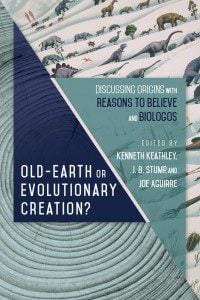 The last post on Old Earth or Evolutionary Creation: Discussing Origins with Reasons to Believe and BioLogos outlined John Walton’s approach to biblical interpretation. Today’s post will summarize the approach taken by Kenneth Samples and Reasons to Believe (hereafter RTB). In many respects the views of RTB and BioLogos are similar. Both take Scripture seriously and view it as the word of God. As Kenneth Samples puts it “Christianity is built on the truth of divine revelation.” (p. 33)
The last post on Old Earth or Evolutionary Creation: Discussing Origins with Reasons to Believe and BioLogos outlined John Walton’s approach to biblical interpretation. Today’s post will summarize the approach taken by Kenneth Samples and Reasons to Believe (hereafter RTB). In many respects the views of RTB and BioLogos are similar. Both take Scripture seriously and view it as the word of God. As Kenneth Samples puts it “Christianity is built on the truth of divine revelation.” (p. 33)
God has revealed himself in nature – RTB is a proponent of the two books model. But God’s self-revelation in history is more significant.
God’s more specific self-disclosure comes in and through his great redemptive acts, events, and words (see Jn 20:31, 2 Tim 3:15-17, Heb 1:1-4). It comes at special times and in special places. This detailed unveiling occurs in two stages. First, God manifested himself through his covenant people, including the Hebrew patriarchs, prophets, and kings (as recorded and interpreted by the prophets in the Old Testament). Second, God’s revelation culminated in the incarnation of Jesus Christ – the God-man whose life, death, and resurrection were recorded and interpreted by the apostles in the New Testament. (p. 34)
I appreciate the emphasis here. It is God’s actions in time and space that constitute his self-revelation. These are recorded in Scripture. We believe in God the Father, in the Son and in the Holy Spirit. This is our foundation. Now Samples and RTB view Scripture as inspired and inerrant. The are certainly not dismissing or devaluing Scripture. Inspiration is … “the divine act whereby God superintended human authors to ensure their writings reflected his revelation” (p. 35) and “God’s absolutely trustworthy nature and moral integrity and his direct supervision of the original autographs resulted in scriptural text that – when correctly understood and properly interpreted – is free of all error (historically, scientifically, morally, and spiritually). (p. 36)
The most significant difference between the RTB view as described by Samples and the view expressed by John Walton is in the RTB view of concordism. According to Samples “concordism is the belief that the book of nature and the book of scripture significantly overlap and can be constructively integrated. … Since Genesis 1-3 records real space-time history, the book of nature may be used to probe that history” (p. 37-38)
RTB – as integral to their name and calling – is focused on an apologetic and evangelistic mission to non-Christians. In this endeavor, it is important to defend the truthfulness of Scripture with intellectual integrity. An excessively literalistic interpretation of Scripture is unwise and counterproductive. All passages are not to be interpreted literally. “One must always guard against reading more into the biblical text than the text actually warrants. An overreach here can expose a biblical viewpoint to public ridicule.” (p. 38)
But RTB also view the concord between science and Scripture as an important evangelistic and apologetic tool. “To read less into the biblical text than what the text teaches can also be a problem. Secularists often interpret such responses as a concession that Scripture cannot withstand objective testing.” (p. 38) While Walton insists that there is no new science in the text, nothing beyond the “science” familiar to the original audience, RTB holds that concord with modern science in the creation account “allows Scripture to be a revelation to all generations, not just the generation in which its biblical human author lived. … Concordism allows for additional messages bearing significance only for future generations to be embedded in the inspired words of the ancient prophets.” (p. 38) These messages went over the head of the original author and audience, but serve to give skeptics confidence in the reliability of Scripture as a divinely inspired text today.
What is your view of concordism?
What are the potential pitfalls of this approach? What are the strengths?
Do those of us affiliated in one way or another with BioLogos tend to read too little into the biblical text?
If you wish to contact me directly you may do so at rjs4mail [at] att.net.
If interested you can subscribe to a full text feed of my posts at Musings on Science and Theology.











